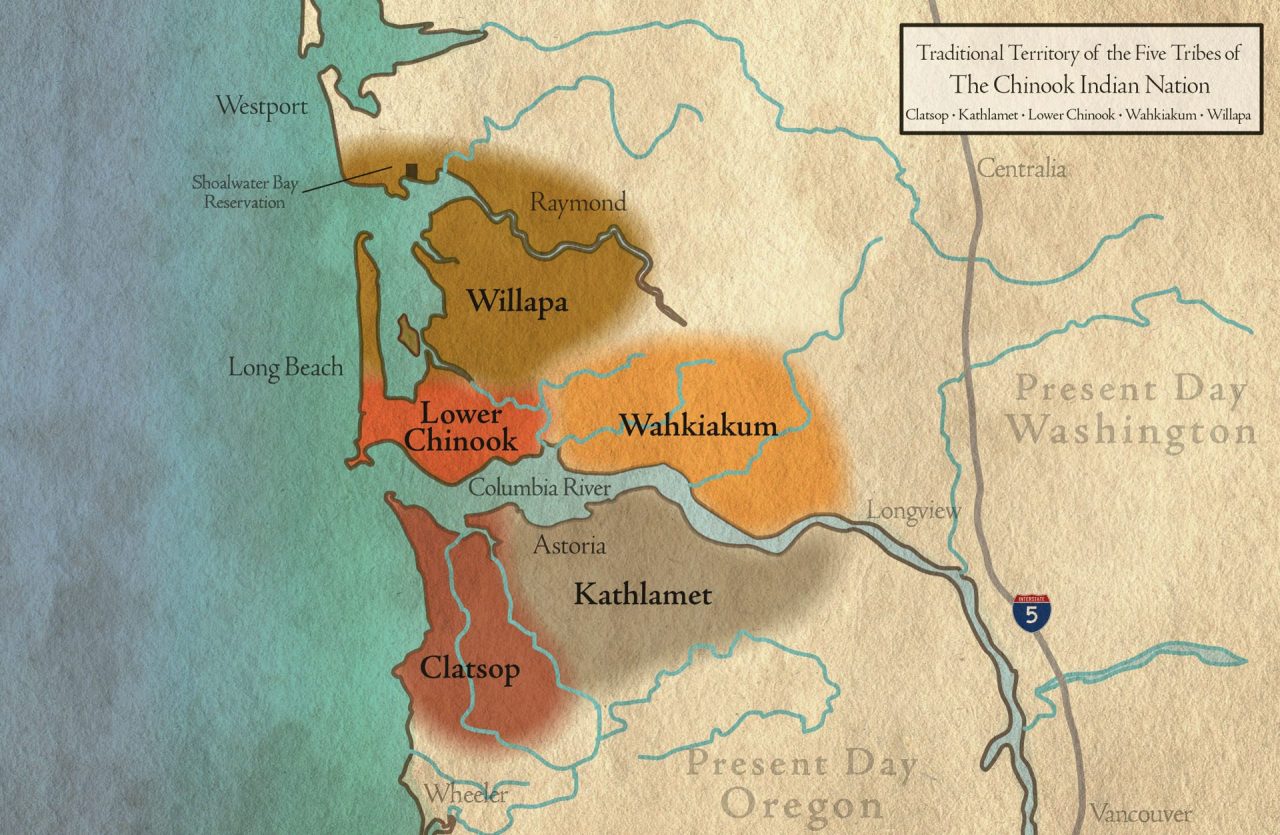By Mark Darienzo
I’ve often thought that staying in one place for long periods of time and being part of a community of friends creates stability and is therefore very important. Although living in Portland for 30 years can not compare with living in an area for thousands of years, I can appreciate the Chinook people’s desire to be recognized by the federal government given that they were the original inhabitants of the land and are still here.
One of Extinction Rebellion’s demands is the 4th Demand, that includes:
1) a just transition that establishes Indigenous sovereignty and
2) reparations and remediation led by indigenous people for years of environmental injustice.
Therefore, we not only must acknowledge that the Chinook Nations land was taken illegally but we must take action in support of their efforts to restore their sovereignty. XRPDX is making a strong effort to live up to the 4th demand, and helping the Chinook will be part of our on-going efforts to support Indigenous rights. This year we have been and still are very active in our opposition to Line 3, a new tar sands pipeline corridor through the treaty territory of the Anishinaabe peoples in Minnesota.
Despite years of petitioning for that status with the federal government, the Chinook Indian Nation is not a Federally Recognized Tribe (see here for more information on what that status entails.) Chinook history, like other indigenous peoples, is one of broken promises (https://chinooknation.org). The following chronicles their history of negative dealings with government entities (in bold) during their ongoing struggle to remain independent and become federally recognized. All quotes taken from https://chinooknation.org/.
1848: as part of the Oregon Territory, the Chinook people are assured that the “government will deal with Natives in good faith and never take their land without consent.” In 1851 the Tansy Point Treaties are negotiated, allowing “the Chinook to remain in their homelands and promised them both provisions and annuities.” Their lands encompass both sides of the lower Columbia River. However, the treat is not ratified by Congress.
1855: “Governor Stevens insists the tribes move to a single reservation far to the north” in Washington. The Chinook and their neighbors refuse. In 1864 the U.S. government takes all Chinook territory in Southwest Washington.
1899: “the Chinook petitions the Claims Commission seeking damages under the Tansy Point Treaties.The claim results in annuity payments in 1912.
1951: the Chinook Nation sues in the Court of Indian Claims and argues that the $26,308 awarded in 1912 for the relinquished 762,000 acres was unconscionable. In 1970, the Claims Commission awards $75,000 for the aboriginal Clatsop and Lower Chinook lands.” After deducting the previous balance, a final judgment of $48,692 is awarded (10¢ an acre). Although awarded, the Chinook do not receive these funds because they are not on the federally recognized tribes list.
1994: “after petitioning the government under a new process created years earlier, the Chinook is finally placed on active consideration by the Office of Federal Acknowledgment. After several months the Chinook received a preliminary negative determination.”
1999: “Assistant Secretary of Indian Affairs, Kevin Gover, hires an independent scholar to assess Chinook history and advise on the tribe’s federal relationship.”
January 2001: “the Chinook is acknowledged as a federally recognized tribe. But in July 2002 the decision is reversed by the Bush Administration and the Chinook is no longer a recognized Tribe.”
2008 – 2010: “Washington Representative Brian Baird introduces the “Chinook Restoration Act.” These bills are sent to Committee but not acted on by Congress.
2015: the Chinook Tribal Council starts the Chinook Executive Recognition Justice Project and “began writing President Obama a letter a day asking for an Executive Order granting Federal Recognition.”
2017: “Chinook Indian Nation sued for Federal Recognition in Federal Court: Chinook Indian Nation v. Zinke.”
2018: “The U.S. District Court ruled that seven of eight claims brought by the Chinook Indian Nation in Chinook v. Zinke will move forward. In May attorneys for the Department of the Interior and Bureau of Indian Affairs asked the judge to dismiss the tribe’s 2017 civil suit. In a June decision, the judge upholds all but one of the tribe’s claims.”
As of Fall 2021 their case is still not settled.
The Chinook Indian Nation is asking people and organizations to contact Congress and the President urging them to restore their status as a Federally recognized tribe – go to https://chinooknation.org/contact-congress/.
Contact information for your Senators and Portland area Congressional Representatives:
Representative Suzanne Bonamici: https://bonamici.house.gov/contact
Representative Earl Blumenauer: https://blumenauerforms.house.gov/forms/writeyourrep
Senator Wyden: https://www.wyden.senate.gov/contact
Senator Merkley: https://www.merkley.senate.gov/connect
Here is a sample letter of support for the Restoration Bill.
Please send a copy of your letter to:
Chinook Indian Nation, P.O. Box 368, Bay Center, WA 98527
[Date]
RE: Chinook Indian Nation Restoration Bill and Clarification of Status
To Whom It May Concern,
Please consider this letter to represent my full support of the Chinook Indian Nation and their efforts to clarify their Federal Status. I understand the Chinook are pursuing a bill through Congress for this purpose and I strongly support these efforts. Including the Chinook Indian Nation amongst the other recognized tribes of the United States is long overdue. The Chinook’s long and history at the mouth of the Columbia River and their important historical influence in the Pacific Northwest deserves to continue and flourish.
As a resident of the region, I know the Chinook people and acknowledge the contributions that they have made locally. There is no doubt that they continue to exist. They will provide an important boost to a diminished local economy and will continue to be an important player in the enhancement of our natural resources. A recognized Chinook Indian Nation is vital for our region.
Further, their traditional knowledge enriches us all and should be preserved. Please respect the opinion and knowledge of our local people that reside in or near the homeland of the Chinook people. Their existence cannot be denied, and it is time to put an end to this historical injustice once and for all.
Thank you for your consideration of this important matter.
Sincerely,
[Your name]
[If relevant, your organizational affiliation]

